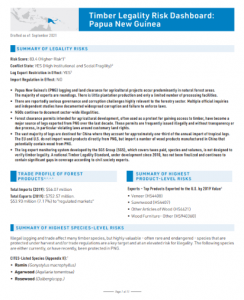Papua New Guinea Timber Legality Risk Dashboard
By Forest Trends View PublicationPapua New Guinea’s (PNG) logging and land clearance for agricultural projects occur predominantly in natural forest areas. The majority of exports are roundlogs. There is little plantation production and only a limited number of processing facilities. There are reportedly serious governance and corruption challenges highly relevant to the forestry sector. Multiple official inquiries and independent studies have documented widespread corruption and failure to enforce laws. NGOs continue to document sector-wide illegalities.
Forest clearance permits intended for agricultural development, often used as a pretext for gaining access to timber, have become a major source of logs exported from PNG over the last decade. These permits are frequently issued illegally and without transparency or due process, in particular violating laws around customary land rights. The vast majority of logs are destined for China where they account for approximately one-third of the annual import of tropical logs. The EU and U.S. do not import wood products directly from PNG, but import a number of wood products manufactured in China that potentially contain wood from PNG.
The log export monitoring system developed by the SGS Group (SGS), which covers taxes paid, species and volumes, is not designed to verify timber legality. A national Timber Legality Standard, under development since 2010, has not been finalized and continues to contain significant gaps in coverage according to civil society experts.

